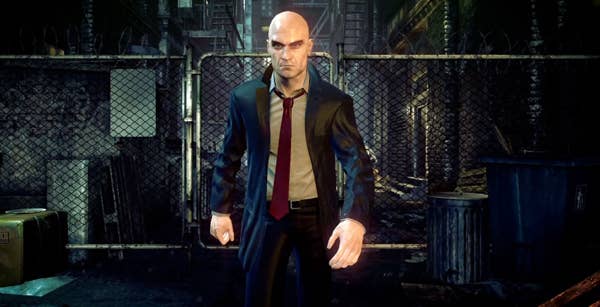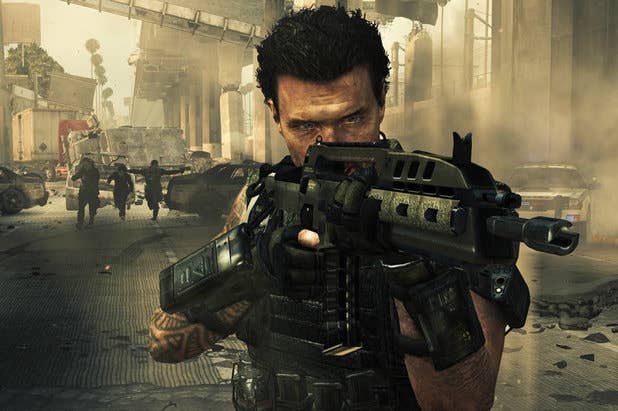Roundtable: Has The Industry Grown Up?
After a year of controversies, we take a hard look at the industry's growing pains
Was this the year that gaming grew up?
Something seems to have changed in the last year or so. We're not sure when it started, but nearly all of us could point to a spot where we noticed it happening.
You might have seen it on Twitter, arguments cast in 140 characters or less. It may have been the sudden, vicious turn of a comment thread or the undertone of dissatisfaction in a headline. You might even have felt like this all along. Things are being challenged, conventions called to account.
Gender imbalance, the lack of inclusivity, the corruption of journalists, issues of maturity, sex and violence, copycatting, the exploitation of the customer - all these issues have been pushed to the fore over the last twelve months. Turned over and inside out, vaunted or ridiculed - there seems to have been barely time to draw breath this year between long, hard looks in the mirror.
For some it's been a welcome change, the relief of realising that there are other people who feel just as angry, marginalised or outright excluded. For others it's been an unwelcome distraction, unnecessary navel gazing which only leads to a pointless stirring of the pot and no real progress - frenzies whipped up by the press for cheap hits and self-glorification.
Whatever you feel about them, many have been almost impossible to ignore. Whether it's the storm of abuse endured by Anita Sarkeesian, the crisis of confidence ignited by Rab Florence or marketing tactics which are somewhere on a scale between condemnable and very clever, this has been a year in which our industry has been pulled from many ruts, asked to reassess and re-examine.
How much has actually changed is debatable, but what is clear is that it's unlikely we're going to see these issues swept back under the carpet. Like it or not, these debates aren't going away. We've hosted and participated in all of these discussions, and more, but we rarely get to comment on them directly. So, read on as we ask our international staff - was this the year that gaming grew up?
Rachel Weber
While I love being part of the games industry, it's just embarrassing when it acts like the guy that everyone tries to avoid at parties. Take this Hitman thing - I'm no angel when it comes to the inappropriate humour, but then I'm not a multi-million dollar corporation with a team of PR and marketing experts who probably earn just slightly more than the queen to make sure things like the "kill the girl with the small tits!" app don't happen. But this year something has changed, and it's the community.
"Yes, there are still trolls furiously masturbating under internet bridges, but I think most sensible peoples' brains can filter that stuff out"
Rachel Weber
When things have gone wrong it's been the community that has stepped in to let companies know they're just not cool with it. Social media means people can communicate directly with the companies or people that have upset them. Yes, there are still trolls furiously masturbating under internet bridges, but I think most sensible peoples' brains can filter that stuff out, and concentrate on the good stuff, like the recent #onereasonwhy movement on Twitter.
So gaming isn't quite a responsible adult with a mortgage and a monthly donation to Amnesty International set up, but it is getting there. At least right now we're more well meaning student in an ironic t-shirt than eight-year-old playground bully.
Matt Handrahan
I have been writing about games for just under 8 years, and 2012 has been a clear high-point for self-examination throughout the industry. Cynicism is a common trait among journalists, and I would be the first to call this hand-wringing into question, but there is an underlying sincerity here that has been absent when such issues have been raised in the past. This year, more than any other, I sense a very real desire to say that we are finally past all of this mess, to congratulate ourselves for talking the industry's problems into submission.
But that doesn't mean that gaming has 'grown up', exactly. Sure, the industry is bigger and more popular than ever before, but the bulk of its products remain sharply divided between the blandly innocuous and the strikingly abrasive. We can hold up Angry Birds and Call of Duty: Black Ops as symbolic of the diversity in modern gaming, but the vast gulf that lies between the tone of these products is not being addressed, leaving a huge number of potential customers out in the cold, and undermining our ability to take a firm stance on issues like race, gender and violence.

The latest Hitman controversy is a case in point. I have been playing Absolution in my free time for much of the last week, and my non-gaming girlfriend has watched me gleefully kill scores of virtual people - both guilty and innocent - in a variety of inventive ways. But when I explained the outcry around the game's Facebook app I was greeted with an apathetic shrug of her shoulders. To someone who sees bad taste as one of gaming's major selling points, the moral outcry over a bad taste marketing stunt is baffling at best and hypocritical at worst.
In her eyes, our collective high-horse has unsteady legs, and we enjoy the view from the saddle far more than the view from the ground.
Dan Pearson
There's that old expression about elephants and tents - how it's better to have one inside, pissing out, than vice versa. It's a a charming analogy, one of those aphorisms with the no-nonsense efficiency of a military background. I've heard it used to illuminate a dozen different scenarios, in a dozen different ways, but for me it sums up the crux of what so much of this year's turmoil has been about.
The idea that, if you're not in the club, then what the hell do you think you're doing trying to change the rules?
"It's not our tent. There have always been others in it, no matter whether we've acknowledged them or not"
Dan Pearson
Allow me to explain, abandoning, for now, the image of tents full of angry, urinating pachyderms. Games, for so many years, were a pretty exclusive club - or so it seemed. At first it was just for nerds, safe amongst labyrinths of terminals and command lines - waiting patiently by squealing tape recorders. Soon, a few more, attracted by bright colours and the tooting of tinny speakers, began to gather round. Cartridges and CD-roms brought another wave, people who'd never typed "" LOAD or cd C:\GAMES.
They were accepted, welcomed, encouraged for the social acceptance and crisp cash they brought with them. For many years, this remained - we knew who we were we knew what we stood for. Aliens, barbarians, race cars and space ships. Heroes, wenches, shotguns and warhammers. Occasionally someone new would poke their head in. Sometimes they'd see what we were doing, tut or sigh and move on. Sometimes they'd bawl us out, accuse us of training to murder or being slobbish and unhealthy, call us names and intimate that we lacked in social graces.
They were, largely, ignored. They didn't understand, didn't get it. Water off a duck's back.
But it wasn't quite. It affected us, there in our little tent, lit crazy neon with the humming glow of our TVs and monitors. It made us defensive, aggressive even - prepared to raise the drawbridge and endure the siege. Pushed into a cultural corner by so many for so long, we began to believe that we were different, that we had a hobby which might make us sad, or immature or weird or portly, but it didn't matter, because we knew how amazing it all really was. Our tiny club of millions. Special.
Then the others came. People waggling wands and planting pumpkins, busting gems on smartphones and playing whole suites of plastic instruments. These weren't our people, not rejects or shut-ins - they hadn't paid their dues. "They'll ruin everything," we cried! "This is not what games are about - you don't understand!" Ignore them, we thought - they'll go away.

They didn't, thank god. They continue to arrive at the door of the tent. Some just want a look, some want to stay. Some of them want to try and make things better, more welcoming, to broaden the church. Some of them, unbelievably, want to take down the club's eternal motto - those sacred words, those two syllables of perfectly efficient exclusion: No Girls. A proposal, it seems, which causes us the most problems by far.
That's all rubbish, of course. It's not our tent. There have always been others in it, no matter whether we've acknowledged them or not. But the thing is - these are valid concerns. They're valid because people have them. Thinking about violence in games and how that might affect children has led to several studies and the use of the straightforward and well recognised certification system we have today. Thinking about mechanics and formats which will appeal to a broad range of ages, interests and abilities has given us an industry which counts hundreds of millions more among its adherents.
"Like any teenager, you're going through an awkward phase where you discover a bit about who you are and what you want to be in the future"
Brendan Sinclair
Perhaps we can start to think about what we can achieve if we bring the bearers of all of these complaints inside the tent, to let them contribute to the bigger picture - to allow them to be heard instead of covering our ears and hoping that it'll all go back to how it once was, because we started this and we're not giving it up.
We're not necessarily wrong about everything. Some people are undoubtedly over-sensitive or looking for any chance to take the moral high-ground, but it's as much their tent as ours. We should let them hold the controller once in a while. Maybe, one day, we can even take down that sign.
Brendan Sinclair
Will 2012 go down as the year gaming grew up? Sort of. Growing up is a process with many stages of development, many phases to go through. Coming into 2012, gaming was like a typical eight-year-old: Zero concept of empathy, throws tantrums, a picky eater who sulked at anything it didn't instantly recognize from a McDonald's commercial, and prone to saying things like, "You don't need LightCore Skylanders Giants because all Giants are already LightCore, don't you know ANYTHING?"
But as the year wore on, gaming seemed to have a series of revelations. Big publishers will abandon all ethics for the sake of profit. Games view women as nothing but sex objects. How can we trust a gaming press that pals around with the people they're supposed to cover? Minority depictions in our games swing between "mildly insensitive" and "wildly racist." Military shooters are trivializing war and viewing guns as nothing but sex objects.

In other words, gaming has become largely aware of these problems, thinks solving them should be trivially simple, and is prone to saying things like, "Everyone else is stupid except for me." So congratulations, gaming. You're a teenager! And like any teenager, you're going through an awkward phase where you discover a bit about who you are and what you want to be in the future. And even if you're not certain what that destination is, you're eager as hell to get there. It's taken you a bit longer than I expected, but after roughly 40 years, here you are. And I know you'll probably roll your eyes at this, but I just wanted to say that we're all very proud of you.
James Brightman
I think Brendan's teenager analogy is spot-on. The industry is far from “grown up” and it does appear at times to be having an identity crisis. What exactly is a game? Who is it for? Are developers supposed to be creating deep, emotionally engaging, cinematic experiences like Heavy Rain? Military shooters like Call of Duty? Expressive, artistic endeavors like Journey? The answer is all of the above. Games need more variety, not less. Where are the new genres? Why is the business - and its marketers - so obsessed with violence? There have to be other ways to engage an audience and to build buzz around a product.
"I can embrace my inner 14-year-old from time to time, but it's like McDonald's - eat too much of it, and you'll regret it"
James Brightman
The industry for years has had tunnel vision, focusing on over-the-top violence, gore, action and special effects. It's partially driven by a fear to branch out but it's also a result of men in suits deciding that any game that doesn't have a three or four next to its title is likely to post lackluster returns for shareholders. Let's face it, it's what's been working. We're a part of the problem because we all run out and buy Call of Duty on launch day. That's not to say Call of Duty is a bad product by any means, but if we're going to complain that we're seeing nothing new, we need to start putting our money into new and innovative products.
The good news is that Kickstarter is enabling that, and the digital revolution as a whole is opening up new avenues for developers to express themselves and take greater creative risks without some suit leaning over his/her shoulder, saying something can't be made because marketing analysis said so.
I saw Lincoln at the movie theater recently, and it made me pause and think - it made me think about the trials and tribulations this great president went through as a civil war raged, the difficulties he had to endure while pushing with his entire soul to pass the 13th Amendment to abolish slavery, and how a great nation managed to heal itself. There aren't many games that can do that - to make you really stop and think - certainly not the ones with scantily clad babes, huge guns, explosions and giblets. I'm 34, but the industry still talks to me like I'm 14. I can embrace my inner 14-year-old from time to time, but it's like McDonald's - eat too much of it, and you'll regret it.

